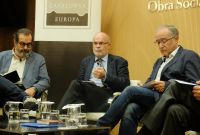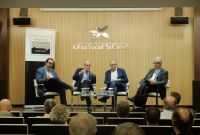If one thing was clear to the debate held on Tuesday, October 6 at the Palau Macaya is that the challenges of Catalan politics are as heterogeneous as the horizon that was opened last 27S for Catalonia and Spain is uncertain. Our three guests, however, were able to convey very understandable messages of their interpretation of what happened, and what they think Catalonia needs to advance in its self-government, whether independence is achieved or not.
"Citizens have spoken, and have given an undeniable victory to the independence candidates," said Antoni Castells, president of the Advisory Council of the Catalonia Europe Foundation. He did it during the presentation of the debate and before giving way to the three guests, Salvador Cardús, Juan José López Burniol and Albert Sáez, who would later support his words. For Salvador Cardús, professor of Sociology at the UAB and member of the Advisory Council for the National Transition, "Catalonia is now stronger than ever, but it must know how to use intelligently".
"If the independence movement is smart, it will understand that time is more in favor than against because without an offer from Spain on the table, it does have more growth prospects than no", followed Albert Sáez, deputy director of El Periódico. According to the notary Juan José López Burniol, Spain has always been one of the main problems of the process, a unitary state with a regional government that has never come to fruition and now, for the first time, "begins to be aware that it has a serious problem, which can destabilize the system, and therefore we have to look for an exit".
It is in this context where dialogue and negotiation take center stage again. "What is the strategy?" Carrying us with a willingness to negotiate is the only possible way out, since this is a marathon and not a sprint, those who show more will to solve things in a civilized way will win. With these words Antoni Castells gave strength to a simple but basic premise: there is no need to run. An idea that López Burniol also shared: "Catalonia must be stubborn, the species that subsist are not the biggest or the strongest, but those that have the most capacity for adaptation, the road is on and there is no turning back; of the ethics of responsibility, not only of the ethics of conviction, timing is very important and things can not be precipitated ".
And it is only in this way that Catalonia will achieve "internal monitoring and external recognition", in the words of Castells. "It is not enough to transgress in Spain, it is necessary that someone recognizes you", will support Sáez. Although López Burniol took weight to the much debated European position in the Catalan issue - "what Catalonia has to be must be by itself, not depending on what others say" - both Cardús and Castells defended the Europeanist vocation of Catalanism and the importance of negotiating with both Spain and the European Union.
In parallel and no less important, according to Cardús, it is now essential that Catalonia "govern the country and provide a good public service", a point at which all the participants agreed. For Sáez, the electoral results also force the need for more dialogue in the interior of Catalonia, among the different options. The growth of Citizens has created a new scenario that must be managed. Although remarkable, for Sáez it is more about a conjunctural change than structural change; justified, according to López Burniol, by the vacuum left by the PSC. Cardus considered this fact of special importance, given that the Socialists have been part of the Catalanist tradition but now they could end up joining parties that do not participate in this tradition.
The situation facing Catalonia is undoubtedly complex and unique. Beyond all the mentioned challenges, all the participants agreed on two aspects that could define very well the will of the Catalan civil society and at the same time mark very clearly what Catalonia could demand, in the strict sense of the word, from now: the recognition of their national identity and the right to the referendum.













